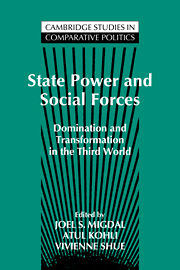Crossref Citations
This Book has been
cited by the following publications. This list is generated based on data provided by Crossref.
Xiaonong, Cheng
1995.
Maintaining Stability and Deepening Reform: A Choice Confronting China Today.
Chinese Economic Studies,
Vol. 28,
Issue. 4,
p.
88.
Price, Pamela
1995.
A Comment on ‘Is the State in India Particularistic?’ by Hans Blomkvist.
Forum for Development Studies,
Vol. 22,
Issue. 2,
p.
309.
Sesay, Max
1995.
State capacity and the politics of economic reform in Sierra Leone.
Journal of Contemporary African Studies,
Vol. 13,
Issue. 2,
p.
165.
Weyland, Kurt
1996.
How Much Political Power do Economic Forces Have? Conflicts Over Social Insurance Reform in Brazil.
Journal of Public Policy,
Vol. 16,
Issue. 1,
p.
59.
Bøckman, Harald
1996.
Informal Chinese Politics: Society in the State.
Forum for Development Studies,
Vol. 23,
Issue. 2,
p.
307.
Migdal, Joel S.
1996.
Between Development and Destruction.
p.
91.
Degnbol, Tove
1996.
The Interactive Approach to the Study of State and Society Relations.
Forum for Development Studies,
Vol. 23,
Issue. 2,
p.
327.
Easter, Gerald M.
1996.
Personal Networks and Postrevolutionary State Building: Soviet Russia Reexamined.
World Politics,
Vol. 48,
Issue. 4,
p.
551.
Lee, Yeon‐ho
1996.
Political aspects of South Korean state autonomy: Regulating the chaebôl, 1980–93.
The Pacific Review,
Vol. 9,
Issue. 2,
p.
149.
Chehabi, H. E.
1997.
Ardabil Becomes a Province: Center-Periphery Relations in Iran.
International Journal of Middle East Studies,
Vol. 29,
Issue. 2,
p.
235.
Sivaramakrishnan, K.
1997.
A Limited Forest Conservancy in Southwest Bengal, 1864–1912.
The Journal of Asian Studies,
Vol. 56,
Issue. 1,
p.
75.
Basu, Amrita
and
Kohli, Atul
1997.
Introduction Community Conflicts and the State in India.
The Journal of Asian Studies,
Vol. 56,
Issue. 2,
p.
320.
Baker, Bruce
1997.
Escape from Domination: The Concept of Disengagement in Third World Studies.
Politics,
Vol. 17,
Issue. 2,
p.
87.
Baker, Bruce
1997.
Beyond the long arm of the law: The pattern and consequences of disengagement in Africa.
The Journal of Commonwealth & Comparative Politics,
Vol. 35,
Issue. 3,
p.
53.
Salloukh, Bassel F.
1997.
Studying Arab politics: The end of ideology or the quest for alternative methods?.
Critique: Critical Middle Eastern Studies,
Vol. 6,
Issue. 10,
p.
109.
Das, R.J
1998.
The social and spatial character of the Indian State.
Political Geography,
Vol. 17,
Issue. 7,
p.
787.
Petras, James
and
Polychroniou, Chronis
1998.
Rethinking globalization: From the future to the past.
Socialism and Democracy,
Vol. 12,
Issue. 1,
p.
187.
Buttel, Frederick H.
1998.
Some Observations on States, World Orders, and the Politics of Sustainability.
Organization & Environment,
Vol. 11,
Issue. 3,
p.
261.
Houtzager, Peter P.
1998.
State and Unions in the Transformation of the Brazilian Countryside, 1964-1979.
Latin American Research Review,
Vol. 33,
Issue. 2,
p.
103.
Shin, Gi‐Wook
1998.
Agrarian Conflict and the Origins of Korean Capitalism.
American Journal of Sociology,
Vol. 103,
Issue. 5,
p.
1309.





